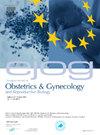Sexuality after breast cancer treatment: A physician’s survey of current clinical practice
IF 2.1
4区 医学
Q2 OBSTETRICS & GYNECOLOGY
European journal of obstetrics, gynecology, and reproductive biology
Pub Date : 2024-09-14
DOI:10.1016/j.ejogrb.2024.09.020
引用次数: 0
Abstract
Background
Side effects of breast cancer treatment (BCT) impact patients’ general and sexual wellbeing. Sexuality related complaints are reported by 70% of breast cancer survivors mainly due to the genitourinary syndrome of menopause (GSM). In clinical care, sexual side effects are often un(der)detected because physicians as well as patients experience barriers to discuss sexuality-related issues.
Materials and methods
We composed an online survey ourselves using known definitions about sexuality and menopause and known factors for not discussing sexuality. We used multiple-choice questions with a Likert scale to optimize interpretation of the statements. 64 practitioners completed the survey. With this online survey, we examined physicians’ knowledge of −and attitude towards- sexual wellbeing and detection and treatment of GSM in breast cancer survivors (BCS).
Results
Vaginal dryness and dyspareunia were the symptoms most associated with menopause (n = 63/64 (98 %) and n = 56/64 (87 %)) and sexuality (n = 63/64 (98 %) and n = 61/64 (95 %)). These 2 complaints were also the most discussed symptoms of menopause (vaginal dryness n = 51/64 (80 %) and dyspareunia n = 45/64 (70 %)). The main reason to not discuss these issues were absence of reporting GSM (n = 40/64 (62 %)) and absence of a direct cause to discuss GSM (n = 35/64 (55 %). 64 % (n = 41/64) of practitioners don’t feel sufficiently educated to discuss and treat GSM. They proposed vaginal estrogens to treat GSM as first or second line respectively in 12 % (n = 8/64) and 46 % (n = 30/64) of symptomatic BCS.
Discussion
Although sexuality related complaints are common in BCS, 64% of all participating physicians feel they are not adequately trained to handle them. More attention towards training of physicians is needed to discuss GSM related complaints also when they are not spontaneously reported by a patient and with clear guidance towards the medical treatment of GSM in BCS.
乳腺癌治疗后的性生活:医生对当前临床实践的调查。
背景:乳腺癌治疗(BCT)的副作用会影响患者的一般健康和性健康。70%的乳腺癌幸存者报告了与性相关的不适,主要是由于更年期泌尿生殖系统综合征(GSM)引起的。在临床治疗中,由于医生和患者在讨论与性有关的问题时遇到障碍,性副作用往往未被发现:我们利用已知的性和更年期定义以及不讨论性问题的已知因素,自己编写了一份在线调查。我们使用了带有李克特量表的多项选择题,以优化对陈述的解释。64 名医生完成了调查。通过这项在线调查,我们了解了医生对性健康以及乳腺癌幸存者(BCS)GSM 的检测和治疗的认识和态度:结果:阴道干涩和排便困难是与更年期(n = 63/64 (98 %) 和 n = 56/64 (87 %))和性生活(n = 63/64 (98 %) 和 n = 61/64 (95%))最相关的症状。这两种主诉也是讨论最多的更年期症状(阴道干涩 n = 51/64 (80 %) 和性生活障碍 n = 45/64 (70%))。不讨论这些问题的主要原因是没有报告更年期症状(n = 40/64 (62%))和没有讨论更年期症状的直接原因(n = 35/64 (55%))。64%的从业人员(n = 41/64)认为自己没有接受过足够的教育来讨论和治疗 GSM。他们建议将阴道雌激素作为治疗 GSM 的一线或二线药物,分别适用于 12 %(n = 8/64)和 46 %(n = 30/64)的无症状 BCS:讨论:虽然性生活相关的主诉在 BCS 中很常见,但所有参与调查的医生中有 64% 认为自己没有接受过足够的培训来处理这些主诉。需要对医生进行更多的培训,以便在患者没有自发报告的情况下也能讨论与 GSM 相关的主诉,并为 BCS 中 GSM 的医疗提供明确的指导。
本文章由计算机程序翻译,如有差异,请以英文原文为准。
求助全文
约1分钟内获得全文
求助全文
来源期刊
CiteScore
4.60
自引率
3.80%
发文量
898
审稿时长
8.3 weeks
期刊介绍:
The European Journal of Obstetrics & Gynecology and Reproductive Biology is the leading general clinical journal covering the continent. It publishes peer reviewed original research articles, as well as a wide range of news, book reviews, biographical, historical and educational articles and a lively correspondence section. Fields covered include obstetrics, prenatal diagnosis, maternal-fetal medicine, perinatology, general gynecology, gynecologic oncology, uro-gynecology, reproductive medicine, infertility, reproductive endocrinology, sexual medicine and reproductive ethics. The European Journal of Obstetrics & Gynecology and Reproductive Biology provides a forum for scientific and clinical professional communication in obstetrics and gynecology throughout Europe and the world.

 求助内容:
求助内容: 应助结果提醒方式:
应助结果提醒方式:


